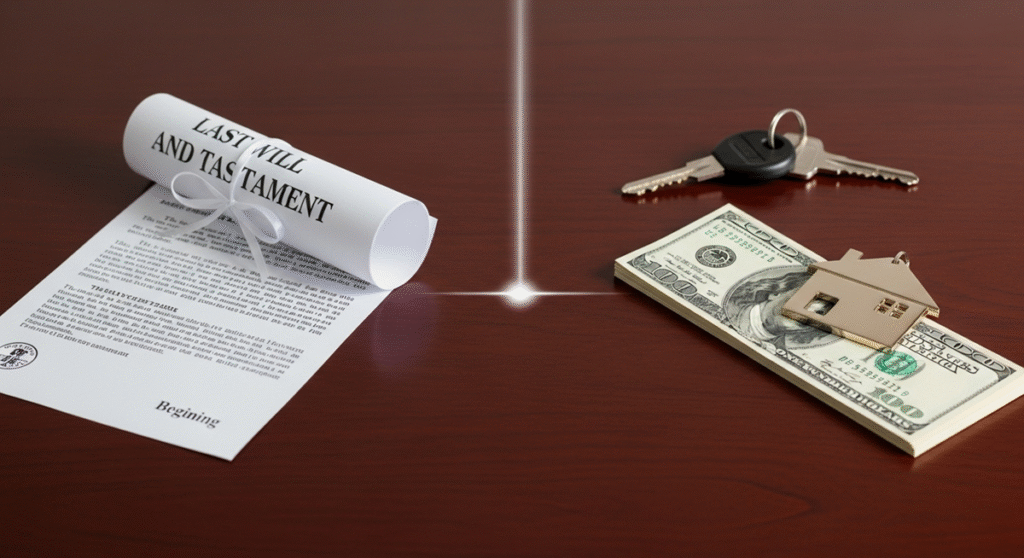| Estate Type | Estimated Timeline |
| Small Estate | 1–3 months |
| Simple Estate | 6–9 months |
| Moderately Complex | 9–15 months |
| Large or Contested | 18–36 months or longer |
⏳ Still waiting on your inheritance?
Most heirs don’t realize probate can stretch 12–24 months.
Check your state’s average timeline and find out where your money really stands.
→ Estimate Your Probate Timeline
Understanding the Probate Process
- What probate is: Probate is the legal step that wraps up a person’s finances after they die. It involves confirming the will, settling debts and taxes, and giving out what’s left to the rightful heirs.
- Who manages it: The court oversees the process, but an executor (either named in the will or appointed by the court) handles the paperwork, collects the assets, pays the debts, and eventually distributes what’s left to the beneficiaries.
- Why it takes time: Because probate must go through court and follow specific procedures, it’s rarely quick. Delays happen even in simple cases, and more complex ones can stretch on for years.
How Long Does Probate Typically Take?
- For a simple estate: Expect around 6 to 9 months. This timeline works if there’s a will, minimal debt, and no arguments among heirs.
- For a moderately complex estate: It could take 9 to 15 months if there are several assets, more paperwork, or moderate complications.
- For a contested or large estate: These cases might drag on for 18 months to over 2 years. Challenges like lawsuits or tax complications can really slow things down.
- For small estates: Some states let smaller estates skip the full probate process. If the estate qualifies, it might wrap up in just a couple of months.
Key Stages of Probate and How Long They Take
- Submitting the Petition: The process begins by submitting a petition to start probate, typically taking 2 to 6 weeks depending on court schedules.
- Notifying heirs and creditors: The executor has to inform everyone involved. Creditors usually get 30 to 90 days to come forward with claims.
- Inventorying the assets: All assets—like real estate, bank accounts, investments, and personal property—must be identified and valued. This stage may take 2 to 6 months, especially for unusual or high-value items.
- Paying debts and taxes: The executor has to settle outstanding debts and file tax returns. This part may take 6 to 12 months, especially if the estate owes estate tax or needs to sell assets to cover debts.
- Distributing what’s left: Once everything is settled, the executor distributes the remaining assets. This usually takes 1 to 3 months after court approval.
What Slows Probate Down
- Large or complex estates: The more assets and paperwork, the longer it takes to sort everything out.
- No will (intestate): Without a will, the court must follow state laws to decide who inherits. That takes time.
- Arguments and legal challenges: If anyone contests the will or disagrees over property, it can lead to long legal delays.
- Court schedules: Some courts are overwhelmed with cases, which slows down the process even more.
- Outstanding debts or taxes: These must be paid before anyone inherits. Tracking down creditors or waiting for IRS processing adds time.
How to Speed Up the Probate Process
- Work with a probate attorney: A skilled lawyer can help the executor navigate the process, steer clear of errors, and take care of the paperwork correctly.
- Keep everyone informed: Good communication among beneficiaries reduces the chance of disagreements and delays.
- Stay organized: Executors who keep documents ready—like the will, death certificate, account numbers, and asset lists—help everything move faster.
- Use informal probate if allowed: Some states offer a less formal process for simple estates, which avoids court hearings and speeds things up.
- Use electronic filing tools: Some courts allow digital submissions, which can cut down on paperwork delays and miscommunications.
How to Get Inheritance Money Before Probate Ends
- Probate advances: These allow heirs to get a portion of their inheritance early through a company that buys out part of their share. It’s not a loan—there are no monthly payments—but you’ll receive less overall because the company takes a fee.
- Estate loans: This option lets you borrow money against your expected inheritance. You’ll need to repay it with interest, and approval often depends on the estate’s size and your credit history.
- Early distributions: If most debts and taxes are already paid, the executor might ask the court to release part of the inheritance early. This isn’t always possible, but it’s worth requesting if the estate is stable.
- Small estate procedures: Some states allow you to bypass formal probate with a small estate affidavit. This applies only if the estate falls below a certain dollar amount, but it’s one of the fastest ways to receive funds.
Risks of Rushing Through Probate
- Unpaid claims: If assets are handed out too soon and a creditor makes a claim later, the executor could be on the hook personally.
- Tax errors: Skipping over proper tax filings or rushing through them could lead to audits or penalties.
- Legal consequences: Executors have a legal duty to follow the court’s timeline and procedures. Mistakes or shortcuts might lead to lawsuits.
- Unfair distributions: Without legal review, early distributions could accidentally shortchange someone or cause later conflicts among beneficiaries.
Conclusion
Probate may feel like a slow-moving process, but it exists for a reason—to make sure everything’s done legally and fairly. While a typical probate case can take months or even years, there are still ways to keep things moving and explore options for getting funds earlier. Executors who stay organized, work with professionals, and keep everyone in the loop tend to have the smoothest experience.
Key takeaway: Even though probate takes time, understanding your options—like probate advances, early distributions, or simplified estate procedures—can help you avoid long delays and financial stress.
FAQs
How long do you have to start probate after someone passes?
Each state sets its own rules, but most require you to open probate within 30 days to a few months after death. Starting late might complicate the process or reduce your legal rights.
What happens when someone owns property in different states?
This usually triggers something called ancillary probate, where additional probate cases are opened in the states where property is located.
Can beneficiaries take action to speed up probate?
They can’t control the court’s schedule, but they can help by submitting requested documents quickly, staying informed, and avoiding legal disputes.
Are digital assets like cryptocurrency handled in probate?
Yes, but only if those assets are known and accessible. Executors need login info or wallet keys to manage them, and those should be documented in advance.
Does probate apply to retirement accounts or life insurance?
Not usually. Assets with named beneficiaries—like IRAs or life insurance policies—bypass probate and go directly to the listed person unless the estate is named instead.



